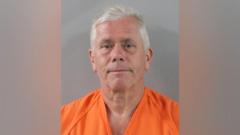A nearly deserted airport in the Florida Everglades is being renovated into a migrant detention facility known as "Alligator Alcatraz." Proposed by state lawmakers, this center aims to support heightened deportation efforts, raising significant environmental and human rights concerns from local communities and organizations.
Florida's 'Alligator Alcatraz': Controversial Migrant Detention Facility Under Construction

Florida's 'Alligator Alcatraz': Controversial Migrant Detention Facility Under Construction
Amid environmental and humanitarian concerns, a decrepit Florida airport transforms into a migrant detention center dubbed "Alligator Alcatraz," enhancing deportation efforts under the Trump administration.
Construction trucks and supplies are flowing into a desolate airport in Florida's scenic Everglades as the state prepares to build a controversial migrant detention facility informally referred to as "Alligator Alcatraz." Despite being positioned in a UNESCO World Heritage Site, local lawmakers believe this site will further bolster the deportation agenda championed by former President Donald Trump.
State Attorney General James Uthmeier spoke about the facility in a social media video, drawing attention to the abundant local wildlife: "You don't need to invest that much in the perimeter. If people get out, there's not much waiting for them other than alligators and pythons." The facility, located at the Dade-Collier Training and Transition Airport around 43 miles from Miami, is set deep within a vital ecological wetland area surrounded by swamps.
As the heat and humidity engulf the area, reporters faced barriers to accessing the site, blocked by guards and accompanied by the eerie sounds from wildlife that fills the air. The decision to repurpose this airport into a detention center followed a 2023 executive order by Governor Ron DeSantis, who cited emergency powers in response to rising migrant numbers crossing the U.S. border.
Scheduled to begin operating by July or August, the detention center will reportedly hold approximately 1,000 detainees. Human rights organizations have raised flags concerning overcrowding; current data shows Immigration and Customs Enforcement (ICE) facilities have a record 59,000 detainees, which is 140% above capacity.
Concerns about both environmental integrity and human rights conditions abound. Local Miccosukee Native American community member Betty Osceola has expressed specific fears about the facility operating for extended periods, counter to assurances it would only serve as a temporary site. Environmental watchdogs and the ACLU of Florida have condemned the project, arguing that it exemplifies a punitive immigration system that neglects detainees and compromises ecological preservation.
While the attorney general's office remained tight-lipped on inquiries, Uthmeier defended the project as a "low-cost opportunity" that would leave detainees with "nowhere to go, nowhere to hide." This is in line with the Trump administration's directive to speed up mass deportations, as echoed in statements made by Homeland Security Secretary Kristi Noem. Florida is set to receive federal aid to expedite the establishment of this facility, seen by many as a concerning shift in immigration policy.
Miami-Dade County's Democratic Mayor Daniella Levine Cava has voiced apprehensions regarding the funded projects' environmental ramifications and has demanded clarity from state officials regarding the site’s usage. Accounts from the local community indicate many undocumented residents reside in fear of escalation in immigration raids, hampering efforts to maintain anonymity within their own neighborhoods.
As Alligator Alcatraz begins to take shape, the intersection of environmental degradation and human rights violations complicates the region's response to a nationwide immigration dilemma.


















